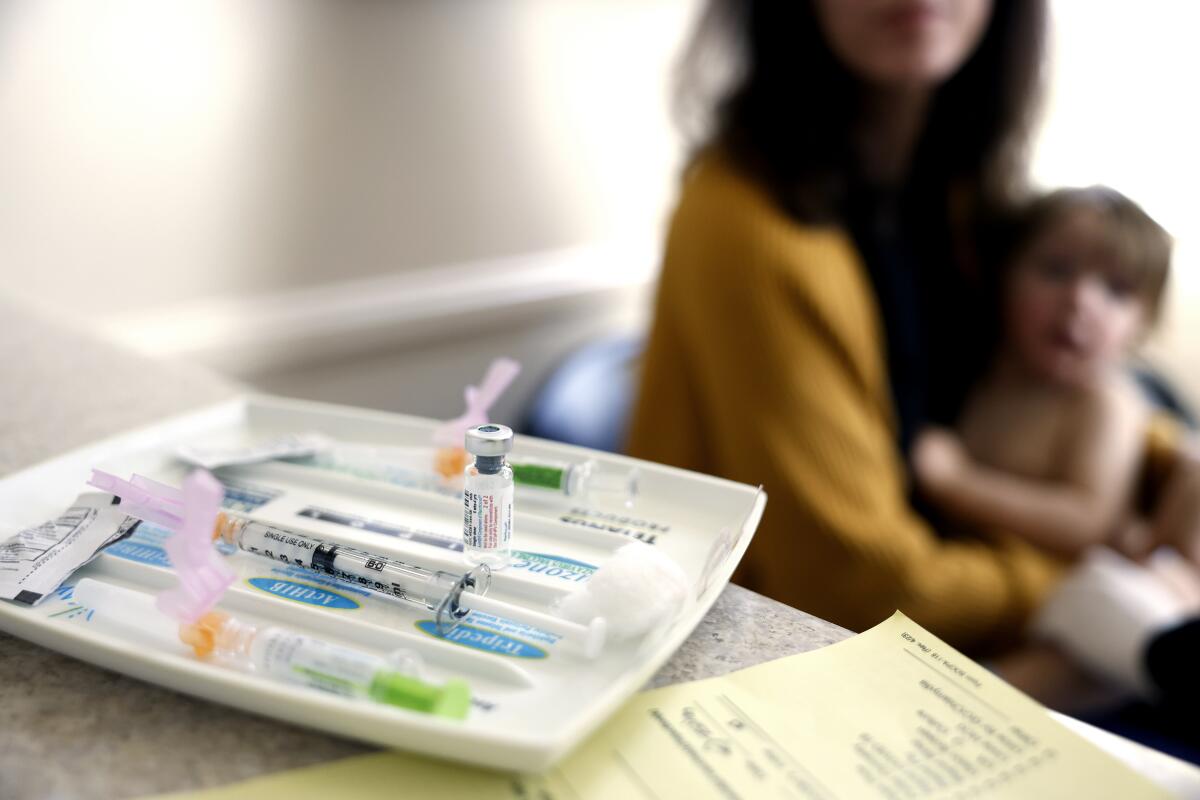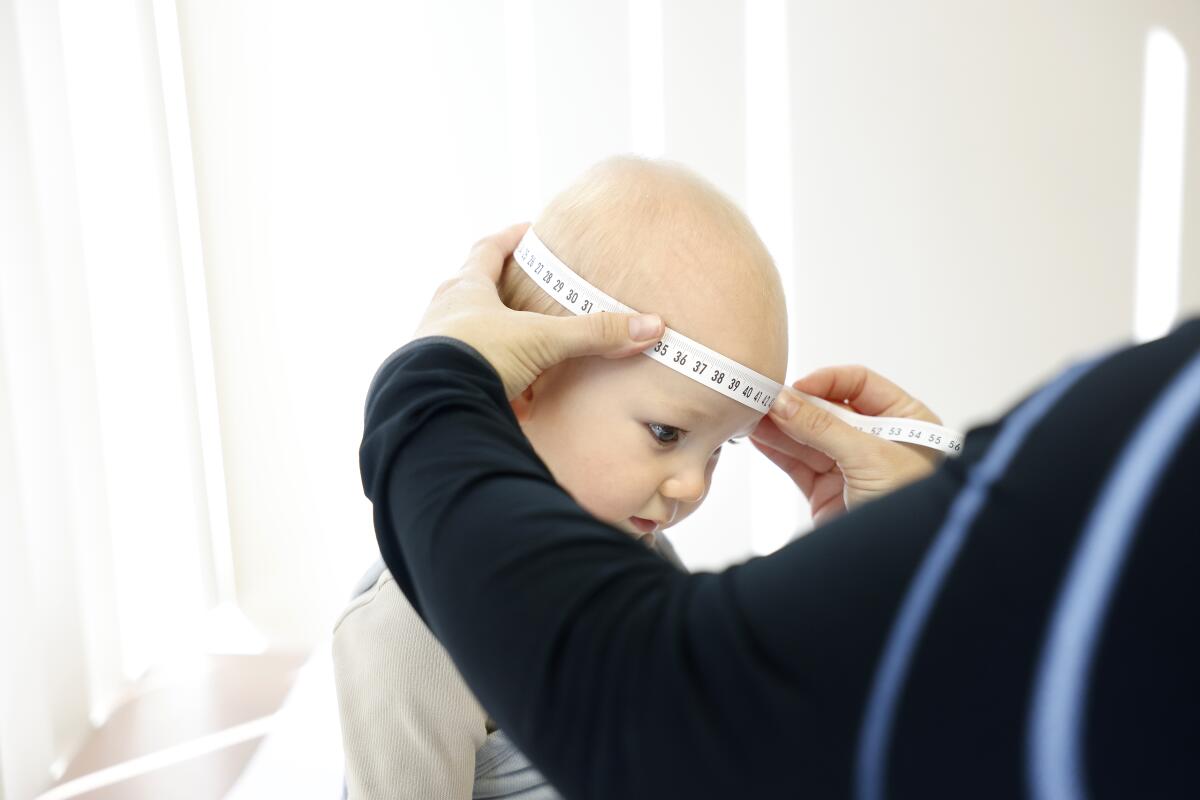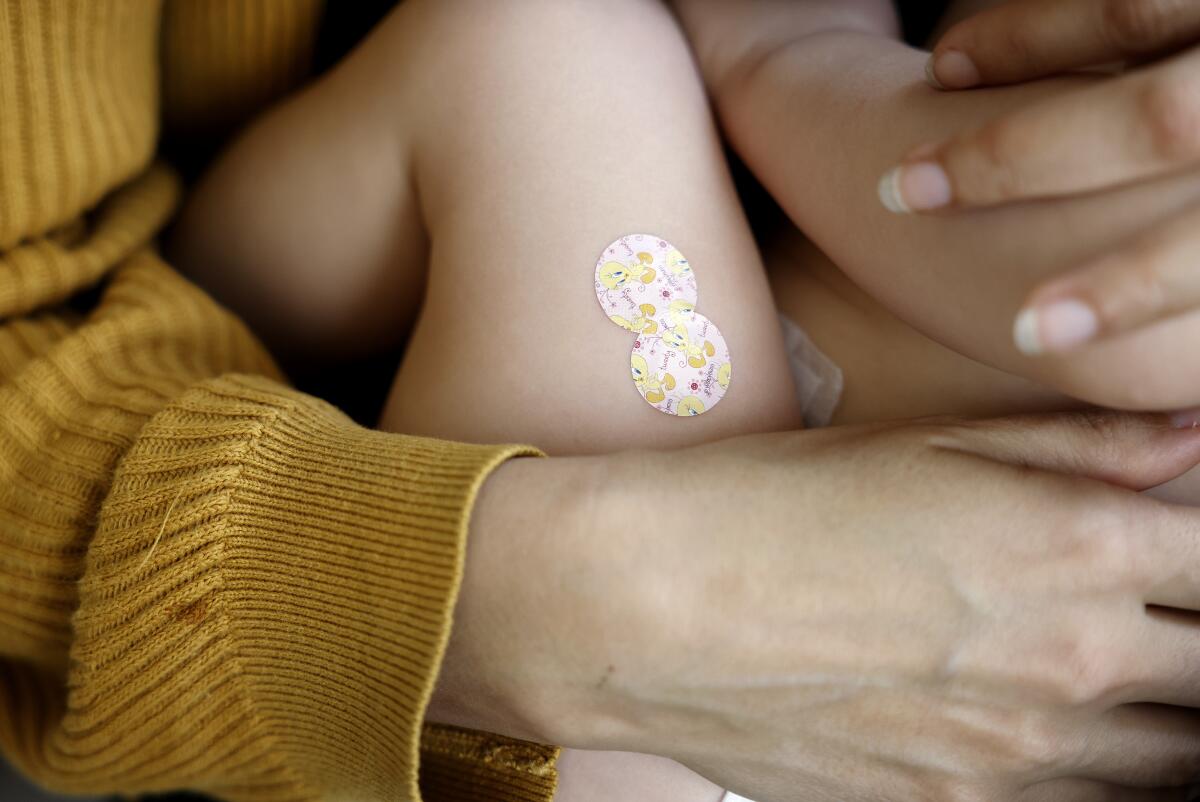
As measles cases emerge across the country this winter — including several in California — one group of children is causing serious concern among pediatricians: the infants and toddlers of vaccine-hesitant parents who skip the measles, mumps and delay their child's rubella.
Pediatricians across the state say they have seen a sharp increase recently in the number of parents concerned about routine childhood vaccinations and demanding their own immunization schedules for their babies, creating a worrying pool of very young children. who may be at risk of contracting measles. , a potentially fatal but preventable disease.
“Especially in the beginning, when a parent already feels very vulnerable and doesn't want to give anything to his beautiful baby who has just been born if he doesn't need it, he thinks, 'Maybe I'll just put it off. and just wait.'” said Dr. Whitney Casares, a pediatrician and author has written about vaccination for the American Academy of Pediatrics. “What they don't realize is that if they don't vaccinate according to the recommended schedule, their child could really be at a lot of risks.”
It is difficult to estimate how widespread such delays have become. California closely tracks the number of preschoolers vaccinated against measles, but does not have extensive data on children at younger ages.
Dr. Eric Ball has seen the change firsthand. In his pediatric practice in Orange County, Ball says he has noticed an increase in parents asking questions about delays since the COVID-19 pandemic, as politicization and misinformation about that vaccine has seeped into discussions about routine childhood vaccinations, including mumps, measles and rubella. , known as MMR.
Dr. Eric Ball examines 9-month-old Noah at Southern Orange County Pediatric Associates in Ladera Ranch on Feb. 28.
(Christina House/Los Angeles Times)
However, instead of an outright refusal, these vaccine-hesitant parents express a gentler form of reluctance, asking if it is possible to use an “alternate schedule” of vaccines, rather than adhering to the recommendations of the Centers for Disease Control and Prevention. Sometimes they try to postpone the filming by a few months, and sometimes by several years.
“I have patients with three children, and they vaccinated the first two children as scheduled. And since COVID, with their third child, they're like, 'I don't know if this is safe. I want to wait until the kids are older,” or “instead of taking two shots today, I want to take one shot,” Ball said. “It just extends the time in which you have a child who is unprotected and could potentially get sick from these diseases.”
He does his best to explain to parents the importance and safety of vaccines, including MMR. He even pulls out his own children's vaccination records to prove his point, and he's often successful. But not always.
At Children's Hospital Los Angeles, the attending pediatrician, Dr. Colleen Kraft that about half of parents question the CDC's recommended vaccination schedule — a significant increase since the pandemic.
“Even my most reasonable parents ask questions. So it's definitely in the mainstream,” she said. She also worries about her patients who are behind on vaccines because they missed so many appointments during the pandemic and are only now returning to her office.

Karla Benzl holds her son, 15-month-old Marcus, before he is vaccinated on Feb. 28 at Southern Orange County Pediatric Associates in Ladera Ranch.
(Christina House/Los Angeles Times)
In Marin County, parental requests to delay vaccinations are so common that Dr. Nelson Branco last month said his practice decided to tighten vaccination requirements as cases of both measles and whooping cough have spread. Babies seen by doctors in the office should have completed their first set of vaccines by four months of age. The primary series of vaccines against the most serious and common diseases, including measles, should be completed within 24 months.
If parents do not agree, they must leave the practice.
“Children do many high-risk things before they are five and need to be vaccinated to go to kindergarten,” Branco said. “They get on international flights, they go to Disneyland where there are a lot of kids,” leaving young children vulnerable to measles when they could be protected.
The CDC recommends that the first dose of MMR be given when a baby is 12 to 15 months old. Typically, this occurs during a child's 12-month well visit. A second dose is then given at age 4 to 6 years.
At least 95% of people in a community must be vaccinated to reach a tier “herd immunity” that protects everyone in a community, including those who cannot get the vaccine because they are too young or have a weakened immune system, the World Health Organization said.
Low vaccination rates have led to measles outbreaks in several states over the past decade. most recently in Florida.
Nationally, the percentage of preschoolers fully vaccinated against measles has fallen from 95% in the 2019-2020 school year to 93% in 2022-2023. According to the CDC.
But there is generally good news in California. Since the state's 2015 ban on parents' personal beliefs as a reason to skip vaccinating children before school, measles vaccination rates among preschoolers have increased from 92% in the 2013-2014 school year to 96.5% in 2022-2023 .
Are you a SoCal mom?
The LA Times Early Childhood Team would like to connect with you! Find us at The Mamahood's mother group on Facebook.
Share your vision and ask us questions.
But delaying vaccinations has created a potential vulnerability gap in a child's first four years.
One in 5 Unvaccinated people who contract measles in the US will be hospitalized. Because there is no good treatment for measles, doctors can often do little more than provide supportive care. One in 1,000 children with measles will develop brain swelling that can leave a child deaf or intellectually disabled; According to the CDC, 1 to 3 in 1,000 children will die.
Measles is so contagious that 90% of people close to an infected person will become infected if they are not immune. According to the CDC. The virus can remain contagious in a room or on a surface for up to two hours after the infected person has left.
In the Children's Hospital Orange County primary care network, which has more than 130 pediatricians, the proportion of children aged 15 months with an MMR vaccine has consistently declined in recent years, from 98% in 2019 to 93.5%. in 2023.
In the early 2000s, anti-vaccine sentiment was at an all-time high for years following the publication of a now debunked and retracted study that falsely linked the MMR vaccine to autism. In December 2014, an unvaccinated 11-year-old boy was hospitalized with measles after a visit to Disneyland. Over the next few months, measles spread to 125 people in seven states.
The outbreak helped galvanize support for vaccination throughout the country. A year after the Disneyland outbreak, California passed the personal exemption ban.
“The pendulum swung the other way and we had a few years where vaccination rates were very high,” Ball said. But the rumors and rhetoric surrounding the COVID vaccines have caused the pendulum to swing the other way. “We're back to conspiracy theories, things people heard on the internet, or something their cousin's neighbor's roommate said. It is very difficult.”

Noah, who is 9 months old, gets measured Feb. 28 by medical assistant Shellee Rayl of Southern Orange County Pediatric Associates in Ladera Ranch.
(Christina House/Los Angeles Times)
A Pew Research poll A March 2023 survey found that 88% of Americans are confident that the benefits of an MMR vaccine outweigh the risks, a percentage that has remained fairly consistent since the pandemic.
But support for all vaccine mandates in schools has waned; 28% now say parents should be able to decide not to vaccinate their children even if it poses health risks to others, up from 16% in October 2019. Among Republicans, this share has more than doubled, from 20% in 2019 to 42% in 2023.
Support for the MMR vaccine was lower among parents with young children, the poll showed. About 65% of parents with children under 5 reported that the preventive health benefits of MMR were high – compared to 88% of all adults – and 39% said the risk of side effects was moderate or high; half said they were concerned about whether all childhood vaccines are necessary.
Tara Larson, a former ER nurse who lives in Santa Monica, said she was concerned about vaccinating children last year when she was pregnant. She started watching anti-vaccine documentaries, reading vaccine safety inserts and following various social media accounts “to make us an informed vaxxer.” We are not anti-vax,” she said.
Larson decided she wanted to delay vaccinating her son until he was three months old, limit him to just three vaccines in his first year that she believed were essential, and spread them out so he would get just one shot a month. “By the time he starts playing on the playground and going to school he will have to start his course of Hep B, but why overload his vaccination course now?” she said.
The first pediatrician she saw refused to follow the requested schedule. But, Larson said, “I just felt in my gut that this was the right thing to do for our baby, and I left.” After weeks of searching, she found a holistic provider who charged a monthly fee of $250 and agreed with her approach.
She said she has not yet decided whether to give her son, who is now 8 months old, the MMR vaccine when he is eligible. “I think some doctors will say to wait until they're three, but there hasn't been a measles resurgence at that point,” she says. “That's my next thing to dive into.”

Karla Benzl of Mission Viejo comforts her 15-month-old son, Marcus, after he receives his vaccinations.
(Christina House/Los Angeles Times)
But there is no scientific basis and no known benefits for delaying vaccines except in very rare medical circumstances, says Casares, whose pediatric practice is based in Oregon.
Casares said the problem is that parents have an “exposure bias.” They often consume a flood of information on social media about the risks, but very little about the benefits of vaccines or the enormous risks of the diseases themselves. She said that in a country like the United States, where vaccination rates are quite high, most people don't see the devastation the diseases can wreak if vaccination rates drop.
This article is part of The Times' early childhood education initiative, which focuses on the learning and development of California children from birth to age 5. For more information about the initiative and its philanthropic funders, visit latimes.com/earlyed.














